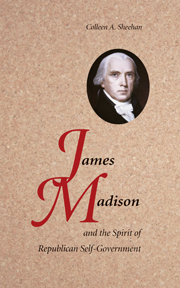Book contents
- Frontmatter
- Contents
- Acknowledgments
- List of Abbreviations for Sources
- Preface
- Introduction: Madison's Legacy
- 1 Republican Opposition
- 2 The Federalist Agenda
- 3 Madison and the French Enlightenment
- 4 The Commerce of Ideas
- 5 The Politics of Public Opinion
- 6 Madison and Jefferson: An Appeal to the People
- 7 The Spirit of Republican Government
- Epilogue: The Philosopher's Stone and the Poet's Reprise
- Bibliography
- Index
- References
3 - Madison and the French Enlightenment
Published online by Cambridge University Press: 05 June 2012
- Frontmatter
- Contents
- Acknowledgments
- List of Abbreviations for Sources
- Preface
- Introduction: Madison's Legacy
- 1 Republican Opposition
- 2 The Federalist Agenda
- 3 Madison and the French Enlightenment
- 4 The Commerce of Ideas
- 5 The Politics of Public Opinion
- 6 Madison and Jefferson: An Appeal to the People
- 7 The Spirit of Republican Government
- Epilogue: The Philosopher's Stone and the Poet's Reprise
- Bibliography
- Index
- References
Summary
Hamilton's fears about the influence of French Enlightenment philosophy on Jefferson and Madison were not ungrounded. Certainly Jefferson's views were significantly shaped by the French authors whom he read and associated with during his ministerial stint in Paris. In the 1780s and 1790s Madison too was a keen scholar of French social and political thought, studying the more radical thought of Turgot, Condorcet, and the physiocrats, as well as the more moderate philosophy of the celebrated oracle, the Baron de Montesquieu.
In the provocative Party Press Essay “Spirit of Governments,” Madison first bestowed rather circumscribed praise on Montesquieu's contributions to the science of politics; he then swiftly turned his pen against the classification of governmental types set forth in The Spirit of Laws. Montesquieu's typology of governmental forms, Madison asserted, “can never be defended against the criticism which it has encountered.” Despite his partial comprehension of the truths of politics, Montesquieu was not in the same league as Newton or Locke, “who established immortal systems” in matter and mind, respectively. Rather, “he was in his particular science what Bacon was in universal science. He lifted the veil from the venerable errors which enslaved opinion, and pointed the way to those luminous truths of which he had but a glimpse himself.”
Montesquieu's influence on Madison and the American Founders, particularly evident in the theory of separation of powers that informs the United States Constitution, is well noted by scholars.
- Type
- Chapter
- Information
- Publisher: Cambridge University PressPrint publication year: 2009
References
- 1
- Cited by



